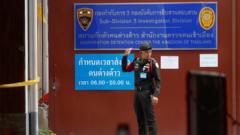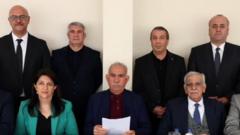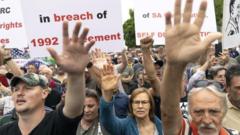### Summary: The U.S. State Department has dismissed approximately 60 contractors from its democracy and human rights bureau, impacting programs in nations like Russia, China, and Venezuela. This move follows an executive order by President Trump that halts foreign aid deemed unnecessary, raising concerns over the future of democratic initiatives abroad.
### Title: State Department Restructures as 60 Contractors Laid Off Amidst Foreign Aid Review

### Title: State Department Restructures as 60 Contractors Laid Off Amidst Foreign Aid Review
### Description: The recent decision to terminate contractors highlights a significant policy shift affecting democracy promotion efforts in various authoritarian states.
The U.S. State Department has taken the controversial step of laying off about 60 contractors working within its democracy, human rights, and labor bureau—an action that is seen as a critical reshaping of its foreign policy agenda in authoritarian regimes. This group of contractors has played a vital role in implementing initiatives that support civil society and democratic norms in countries such as Russia, China, Iran, North Korea, Venezuela, and Cuba.
Officials have indicated that these contractors, who provided technical expertise and regional knowledge, were essential in executing the bureau's various programs. This bureau, with a budget ranging from $150 million to $200 million annually, has also overseen funds directed to other democratic projects like those handled by the National Endowment for Democracy.
The decision to terminate these positions comes in the wake of an executive order signed by President Trump on January 20, which aims to suspend any programs or funds that could be categorized as foreign aid. Republican figures often criticize the bureau for allegedly favoring political factions that oppose conservative elements in various countries, suggesting that such programs can inadvertently support instability.
As a result of this administrative cut, there are growing concerns regarding the impact on international relations and the prospects for strengthening democratic frameworks in regions already facing oppressive governance. The bureau's remaining 200 full-time employees, predominantly based in the U.S. capital, are now left to manage ongoing projects amidst mounting uncertainties regarding future funding and direction.





















